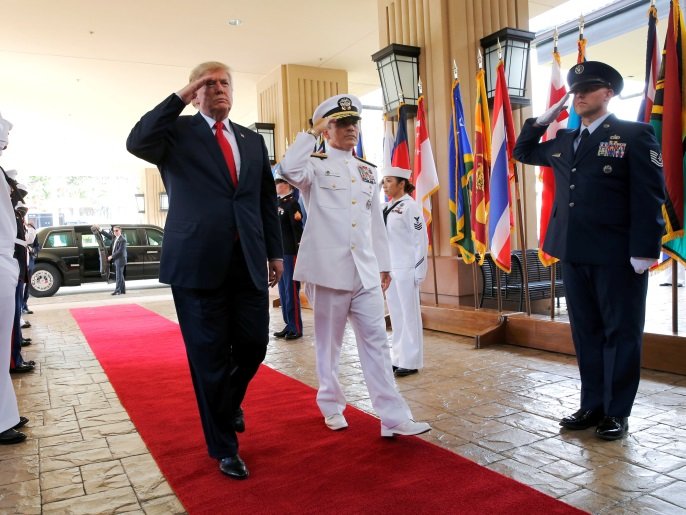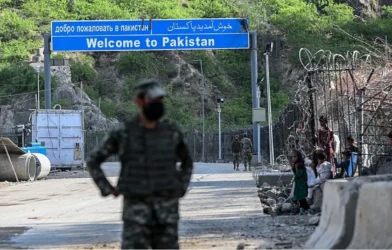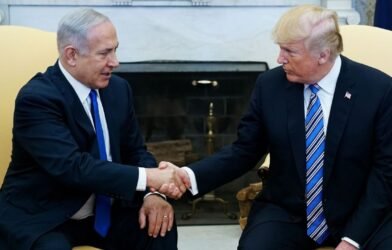Subtotal $0.00
- The Bipolar Struggle for Dominance
- The Initiative and the Imperative of Arab Geography
- The Israelis are the only winners
When the Chinese president stood up Xi Jinping at Nazarbayev University Kazakhstan in 2013 to announce the launch of the Silk Road of the 21st century, inaugurating a new phase of Conflict The American-Chinese Cold War. It is Cold war But it is not with the Soviet Communist Party but with its Chinese counterpart, and it looks like it will be no less difficult for the Americans.
The Bipolar Struggle for Dominance
Since the collapse of USSR At the beginning of the 1990s, I sensed United States Dangerous to grow China Despite the conservative policy led by former Chinese President Jiang Zemin, a set of plans were developed to contain China at the international and regional levels.
These plans evolved during the era of former U.S. President Barack ObamaThe Pivot to Asia project and the Trans-Pacific Partnership (TPP) free trade treaty, which included all East Asian countries except China, relied on providing economic incentives to these countries to make their association with America stronger than their association with China, and was crystallized through two projects: the Pivot to Asia project and the Trans-Pacific Partnership (TPP).
| “ China has based its vision - which it wants to change the face of Asia and bring it into the modern age - on a project that is more than 2,000 years old: the Silk Road. This road ran from China through Central Asia to the shores of the Mediterranean, and from there by sea to Europe, which received the precious Asian goods of the time: spices, porcelain, and Chinese silk “ |
The Chinese soon renamed their project the "Belt and Road Initiative" from "One Belt One Road," while the Americans are still engaged in detailed negotiations with Asian countries over the Trans-Pacific Partnership (TPP) trade agreement passed by the U.S. Congress after a resistance that accused the agreement of wasting money and jobs in favor of foreign countries.
China has based its vision - which it wants to change the face of Asia and bring it into the modern age - on a project that is more than two thousand years old: the Silk Road. This road ran from China through Central Asia to the shores of the Mediterranean, and from there by sea to Europe, which received the precious Asian goods of spices, porcelain, and Chinese silk.
In its initiative, China has put forward solutions to chronic issues that have plagued it for decades. These include enabling inland states to integrate into the global economy, linking and strengthening the border states' affiliation with the center and increasing their economic equality, especially the Xinjiang (formerly East Turkestan) and Tibet in which separatist tendencies are growing, sometimes taking an armed form.
In 2015, the Chinese government announced a paper called the "Operational Plan for the Belt and Road Initiative," which included the broad outlines of the initiative, inviting countries in Asia and the world to join it, and made participation in the Asian Infrastructure Development Bank (AIDB) - in which China has a majority stake - the entry point for participation in the initiative.
Today, there are nearly seventy countries participating, and not all of them are Asian or Third World countries; European countries have participated as Germany and Britain for example, but the United States boycotted it.
She also created Beijing Experts have differed widely in estimating the expected value of the initiative's projects, with some estimating the cost at around one trillion dollars and others estimating it at eight trillion dollars dollarThis disparity stems mainly from the fact that the initiative is still in a fluid phase, and the partners and projects that will be adopted have not been finalized.
The Initiative and the Imperative of Arab Geography
Preliminary plans for the initiative indicate that the adopted lines (six in total) have half of them running or ending on the banks of the Mediterranean Sea This is why China pays great attention to this region in the public relations plan it is practicing to convince the world of the initiative.
Perhaps the most distinctive feature of Chinese foreign policy in the Middle East is its focus on pacifying this region, which is usually characterized as unstable due to internal wars and revolutions, by supporting the ruling regimes.
Beijing does not care about the nature of the ruling regime in terms of ideology, ethnicity, or sectarianism. All it cares about is securing maximum security stability, so that roads, railways, ports, communication systems, and free trade cities can operate smoothly and safely, and it is ready to provide all possible economic, military, and political assistance to these regimes to achieve this.
| “ Beijing does not care about the nature of the ruling regime in terms of ideology, ethnicity, or sectarianism. All it cares about is securing maximum security stability, so that roads, railways, ports, communication systems, and free trade cities can operate smoothly and safely, and it is ready to provide all possible economic, military, and political assistance to these regimes to achieve this “ |
This is what we see her doing today in Myanmar And SyriaAlthough Beijing declares that the fate of Bashar al-Assad determined by the Syrian people, it has increased military support for his regime and protected it in Security Council In cooperation with RussiaThe Syrian issue has become the one in which China has used the right to Veto in its history (six times).
In EgyptThe Chinese government has a good relationship with the Abdel Fattah al-SisiAlthough the government that governs Cairo Today it turned against the first elected civilian president in Egypt's history, the Mohamed Morsi The first foreign visit of a non-Arab country to China, he brought with him a large delegation that included seven ministers and more than seventy businessmen.
Although Sisi is much closer than Morsi to China's arch-rival, the United States, he belongs to the military elite that has ruled Egypt for more than half a century, and China has become very familiar with the way it thinks and manages its international relations.
It is notable today that Yemen It is the only Arab-Asian country that has not yet joined the Asian Infrastructure Bank, perhaps due to the war in the country and the potential threat it poses to shipping lanes that pass through the Strait of Bab al-Mandab. However, the relationship with Iran and Saudi Arabia and the Emirates -each of which supports one side of the country's conflicting forces, is apparently good enough.
This makes China more comfortable in this regard, but this is not always the case; Saudi Arabia is often accused of funding separatist groups in Myanmar and eastern Iran and Iraq This means accusing Saudi Arabia of aligning itself with the US strategy of disrupting Chinese projects and draining it with internal and regional conflicts.
The Israelis are the only winners
Palestinian beaches, starting from Gaza And even Haifa - the natural terminus of the Silk Road, as it has been for more than a thousand years; but today circumstances have changed with a new authority in this important part of the world (IsraelFrom China's pragmatic perspective, it doesn't matter whether this authority is an occupying or a national authority, what matters is the extent to which it is willing to engage with this global initiative.
The Israeli occupation authorities were early signatories to the Asian Infrastructure Bank, and appear to have promising plans that complement the growing Israel-China relationship in the economic and armaments sphere.
| “ Today, Israel is promising itself abundant profits as a result of what Israeli researchers propose that Israel has modern ports, advanced railways and a modern administrative system. It does not need a long time to integrate with the proposed Chinese projects, unlike all Asian countries through which the BRI passes, and offers a land line that is ready to be used immediately “ |
Today, Israel is promising itself abundant profits as a result of what Israeli researchers propose that Israel has modern ports, advanced railways, and a modern administrative system. It does not need a long time to integrate with the proposed Chinese projects, unlike all Asian countries through which the Belt and Road Initiative passes, and offers a land line that is ready for immediate use, which runs from the Red Sea port of Eilat to the southern ports of Adud and Ashkelon and the northern ports of Haifa.
As for what could be in store for the coming days of serenity with the Arab countries, as stated by Israeli Prime Minister Benjamin Netanyahu and his clique, it is a railway line that could extend from the Gulf through Saudi Arabia, through Jordan, which has long talked about its plans to build such a railway, to Haifa on the Mediterranean Sea, through the occupied Palestinian territories, all the way to Haifa on the Mediterranean Sea.
In addition to reaping huge profits as a result of this short and efficient line, it would establish Israel as a natural part of the international system in the region.
On the Palestinian side, China has excellent relations with President Mahmoud Abbas, who always expresses his desire for good relations with China. Palestinian-Chinese relations date back to not so long ago, when during the Cold War, China supported the Palestinian resistance, but today it seems that Chinese priorities have undergone a major change, with ideological motives giving way to "pragmatic" motives.
Perhaps the most important thing that China can gain from this relationship is trying to convince Abbas to adopt "peaceful solutions" to the Palestinian issue that will stabilize the region and make it suitable for the implementation of Chinese projects.
The Israelis themselves have become skeptical of his ability to control the Palestinian decision and the armed popular resistance on the ground, which means that the party capable today of igniting any confrontation with the Israeli occupation and dragging the entire region into a deep abyss of conflict that would make it impossible to implement Chinese projects is the Palestinian resistance, which does not appear to have a voice in this regard.











